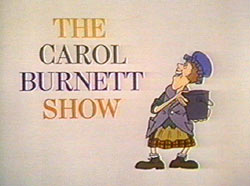When I was in first grade, mom and dad went away for a few days and they left me with their friends the Emorys for safe keeping. I don't remember a whole lot from that visit, except that Mrs. Emory allowed me to bang away on the piano for quite some time, and she never complained within my earshot. I did notice that she seemed maybe a little too ecstatic when I accidentally hit upon the first few notes of Mary Had a Little Lamb. She rushed into the living room and helped me play the rest of the song. I felt her relief. People think children don't know these things, but I remember thinking at the time how annoying it must have been for her to have to endure my pounding away at the piano keys. I doubt I mentioned it, but I appreciated her patience. I learned how to play that song that day, and never forgot. That's not what this is about, though.
In the kitchen of the Emory household hung a calendar with the iconic cartoon cleaning lady from the Carol Burnett Show. She looked bedraggled and rested on a mop with the words "To hell with housework!" next to her. I asked Mrs. Emory what that meant. She said "it means she really doesn't like doing housework." Later that same day, my parents received a call from my teacher, because I'd written "to hell with mathwork" on my math worksheet. That was the day I learned that polite children do not use the word "hell" and they certainly don't go around writing it on their papers. I got quite a talking to from the teacher and the principal that day, all about what a naughty thing I'd written on my paper. I was asked why I would write such a thing, but the question referred to where I'd heard the word, not what motivated me. Indeed, never once did anyone ask why I really didn't like mathwork.
As I endured the remainder of my formal education, I seethed with animosity toward all topics math. I struggled in each math class, passing each by the skin of my teeth and only with incessant complaint. Dad helped me with my math homework by yelling at me that he couldn't fathom why I wasn't getting it. He meant well, and I understand his frustration. It's OK. By the time I rounded the final curve of high school I was beginning to see glimmers of usefulness for math. When I was in college it dawned on me that there was never any reason for me not to have mastered all that basic math. A bit too late, because I missed the foundations and while I appreciate the logic and, yes, simplicity, of the language of math, I have forgotten most of algebra and trigonometry.
One of my favorite quotes attributed to Albert Einstein is this - if you can't explain it simply, you don't understand it well enough. Why did no one wonder why I would want to send my math to hell? Why did my teacher not take that as an affront to the topic, and try to help me find my way to grasping it instead? Why do we allow a child who earns a C in her math class to advance to the next level? A grade like that says this student absolutely does not understand it well enough to explain it simply. Why, particularly in the early elementary school years, do we allow scores that low on any topic? I know there are so many children, and so few educators, and we're just trying to escort everyone to adulthood while hoping each kid finds something for which she has an unending curiosity. It's unlikely all kids will master all subjects. So we agree everyone should at least have a passing knowledge of what we consider the basics, but to this day, I feel given up upon. I am amply aware that I presented a considerable challenge to those who tried not to give up on me, as far as math is concerned. Still, there was a moment there, very early on, when I was pointed down a rocky math path that I think was a chance to redirect me. I am sad that math and I weren't better friends. As a parent now, I worry...am I already missing a key redirect moment? Can it be helped?
I carry the threat of missing a key moment on the outer edges of my daily existence with you. I know your life is your responsibility, but parents are a tangible representation of the ego - we accidentally instill fears by fearing you'll be afraid. I want you to love learning, but you are being educated in much the way I was - in segments and boxes and with lots of punitive "motivation". The answer, of course, is that I must be the student I'd like you to be. I think of it every time you stop to observe the greenery along our walks, searching for 4-leaf clovers and noticing bugs. I think of it because I invariably hear myself say "come on, let's go!" which is the antithesis of what I want for you. I think what I'm trying to tell you here, girls, is this - don't write curse words on your homework papers. I kid! I will consider us fortunate if you'll be so verbal; I hope we'll be on it enough to pay attention, and ask why.

1 comment:
Kate and Sarah, it says here your childhood officially ended on April 18, 2013. You had a good run. Now get a job.
Post a Comment